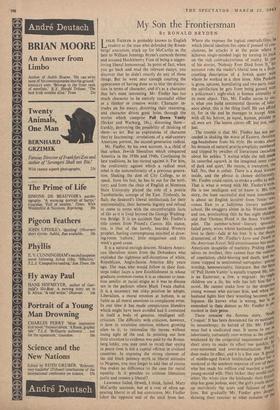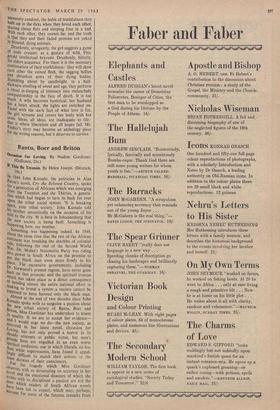My Son the Frontiersman BY RONALD BRYDEN .
LSLIE FIEDLER is probably known to English readers as the man who defended the Rosen- bergs' execution, stuck up for McCarthy as the heir to William Jennings Bryan's corncob throne and accused Huckleberry Finn of being a nigger- loving liberal homosexual. In point of fact, when you go back and read the relevant essays, you discover that he didn't exactly do any of those things. But he went near enough courting the appearance of having done so to blur the distinc- tion in terms of character, and it's as a character that he's most interesting. Mr. Fiedler has too much character to be entirely successful either as a thinker or creative writer. Character in- trudes on his essays, distorting their reasoning, and character drives great holes through the stories which comprise Pull Down Vanity (Seeker and Warburg, 18s.)! distorting them— frankly, destroying the possibility of thinking of them—as art. But as expressions of character they're fascinating: revelations of a mid-century American portent, the second-generation radical.
Mr. Fiedler, by his own account, is a:child of that urban, Jewish liberalism which conquered America in the 1930s and 1940s. Continuing its best traditions, he has turned against it. For him, the conformity against which a radical must rebel is the nonconformity of a previous genera- tion. Shaking, the dust of City College, so to, speak, from his feet, he has lit out for the terri- tory; and from the chair of English at Montana State University played the role of a prairie „ .
Tamburlaine, scourge of the East. Tirelessly, he flails the Seabord's liberal intellectuals for their sentimentality, their hermetic bigotry and refusal to come to terms with the uncomfortable facts of life as it is lived beyond the George Washing- ton Bridge. It is no accident that Mr. Fiedler's title comes from Pound's Cantos. His stance, too, is that of the bawdy, bearded Western prophet, hurling contemptuous, mischief at draw- ing-room 'culture,', little magazines and this week's good cause.
It is a natural enough descent. Modern Ameri- can liberalism stems from the Debunkers who exploded the righteous self-deceptions of white, Republican, Anglo-Saxon America fifty years ago. The man who would follow in their foot- steps today faces a new Establishment in whose graduate common-rooms it is as obscene to men- tion senility or racial origin as it was to discuss sex in the parlours where Mark Twain chafed. It is a necessary but risky position he adopts. Liberalism, a moral emotion at bottom, is as liable as all moral emotions to complacent error. In our time it has made conspicuous blunders which might have been avoided had 'it contained in itself a body of genuine, intelligent self- criticism. The difficulty with criticism, however, is how to scrutinise emotion without growing alien to it; to rationalise the means without losing sight of the end. In pointing out how little attention to evidence was paid by the Rosen- berg lobby, you may omit to recall that spying in peace time is not a capital offence in civilised countries. In exposing the strong element of the old black potency myth in liberal attitudes- to Negroes, you may forget to add that of course this makes no difference to the case for racial equality. Is it possible to criticise liberalism justly and remain a liberal?
Lawrence failed. Orwell, I think, failed. Mary McCarthy succeeds, but at a cost of often ap- pearing liberal in all but conviction. Mr. Fiedler takes the opposite end of the stick from her. Where she exposes the logical contradictions to which liberal idealism lies open if pressed to con- clusions, he 'attacks it at the point where it achieves single-minded logic by turning its back on the rich contradictoriness of reality. In one
of his stories, 'Nobody Ever Died from It,' his
narrator rubs the reader's liberal nose in a flesh- crawling description of a Jewish queer with
whom he worked in a shoe store. Abie Peckelis
is gross, epicene, humiliating and two-parts mad; the satisfaction he gets from being goosed with a policeman's night-stick is human animality at its most abject. This, Mr. Fiedler ,seems to say, is what you build sentimental theories of toler- ance about, this is the thing itself. He can afford to, for in the end he manages to accept Able, with all his horror, as equal, human, pitiable as all men are. The lesson comes off; but just, only just.
The trouble is that Mr. Fiedler has not sue' ceeded in shaking the worst of Eastern, theoretic egg-headedness from his style. He strides about his domain of natural prairie simplicity cumbered and tripped by swathes of iiterariness cascading about his ankles. 'I waited while the bell, made its catarrhal squawk in the imagined inner cube of dark and quiet.' He means, it transpires, the hall. No, that is unfair. There is a dead woman inside, and the phrase is chosen deliberatelY, Mr. Fiedler could rejoin, to evoke a coffin as well. That is what is wrong with Mr. Fiedler's style. Heis too intelligent not to know it. His 'title story, the least successful, and most interesting, is about an English lectUrer from Texas wile comes East to a ludicrous literary summer' school. He swaggers about in his Western shirt and tan, proclaiming that he has eight children and that 'Thomas Hood is the finest Victorian pOet. The summer-school-literary spinsters, failed poets, wives whose husbands cannot,make love to them—falls at his feet. It is the thesis' dramatised, of Mr. Fiedler's Love and Death 1$ the American Novel. Self-consciousness has made Americans incapable of mattirity. Priding their', selves on intellect, they cannot face the realine, of copulation, child-bearing and death, and 'be- come trapped in sentimental surrogates: Pin-4113„ worship, homosexuality, literature. But the her" of Tull Down Vanity' is equally trapped. 14e, ton, is an Easterner, a Jew, a migrant: his eight children are a lie, his wife has -left him for novel. He cannot make love to the desperate, young woman who pursues him, and when he' husband fights him their wrestling becomes arn; biguous. He knows what is wrong, but is 3 enmeshed in their disease as Mr. Fiedler i5 err meshed in their prose. There remains the famous story, 141,c Croquet.' It has been denounced for its nastiness'( its misanthropy, its hatred of life. Mr. Fiedl.,c must feel a vindicated man. It seems to me laboriously, tortuously over-written as the others' weakened by the congenital requirement of a! short story to make its effect too' quickly. qt over-statement and over--dramatisation. But' 1,t does make its effect, and it is a fine one. A gr°111-,, of middle-aged Jewish intellectuals gather for 8 weekend at the seashore mansion of one of the,rilie who has made his million and married a nu l% young second wife. They bicker, they needle each other, the wives claw the husbands; their Merin, ship has gone jealous, sour, the girl's youth sll°w' up mercilessly the scars and failures of theic lives. But gradually Mr. Fiedler goes deePen showing their rancour as what remains of tte
University candour, the habit of truthfulness they built up in the days when they loved each other, sharing cheap flats and sleeping four in a bed. With each other, they cannot lie; and the truth is that they and their faded promise are yoked to bloated, dying animals.
Drunkenly, arrogantly, the girl suggests a game 01 nude croquet, as a gesture of wild, Fitz- gerald intellectual bravado. Drunkenly, bitterly, the elders acquiesce. For them it is the necessary continuation of their truthfulness: they will show each other the veined flesh, the sagging bellies and shrunken arms of their dying bodies. Stumbling about by candlelight, in a half.. darkness smelling of sweat and age, they perform a ritual re-forging of intimacy into melancholy companionship in the face of death. It is too much. A wife becomes hysterical, her husband has a heart attack, the lights are switched on.. Faced with the stark fact of what love is for, the girl screams and covers her body with her arms. Ideas, all ideas, are inadequate to life: that is where liberalism and all hopes fail. Mr. Fiedler's story may become an anthology piece fOr the wrong reasons, but it deserves to survive.















































 Previous page
Previous page